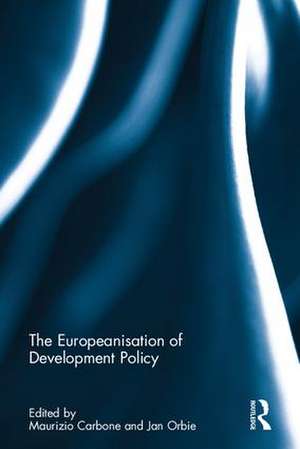The Europeanisation of Development Policy
Editat de Maurizio Carbone, Jan Orbieen Limba Engleză Hardback – 12 dec 2017
| Toate formatele și edițiile | Preț | Express |
|---|---|---|
| Paperback (1) | 175.76 lei 6-8 săpt. | |
| Taylor & Francis – 12 dec 2019 | 175.76 lei 6-8 săpt. | |
| Hardback (1) | 524.78 lei 6-8 săpt. | |
| Taylor & Francis – 12 dec 2017 | 524.78 lei 6-8 săpt. |
Preț: 524.78 lei
Preț vechi: 703.30 lei
-25% Nou
Puncte Express: 787
Preț estimativ în valută:
100.43€ • 104.46$ • 82.91£
100.43€ • 104.46$ • 82.91£
Carte tipărită la comandă
Livrare economică 14-28 aprilie
Preluare comenzi: 021 569.72.76
Specificații
ISBN-13: 9781138041691
ISBN-10: 1138041696
Pagini: 158
Dimensiuni: 174 x 246 mm
Greutate: 0.45 kg
Ediția:1
Editura: Taylor & Francis
Colecția Routledge
Locul publicării:Oxford, United Kingdom
ISBN-10: 1138041696
Pagini: 158
Dimensiuni: 174 x 246 mm
Greutate: 0.45 kg
Ediția:1
Editura: Taylor & Francis
Colecția Routledge
Locul publicării:Oxford, United Kingdom
Public țintă
Postgraduate and UndergraduateCuprins
Introduction: The Europeanisation of development policy 1. Europeanisation through the prism of regime complexity: the case of French aid 2. An end to Nordic exceptionalism? Europeanisation and Nordic development policies 3. Italy’s development policy and the domestic politics of Europeanisation: why Europe matters so little 4. Europeanisation should meet international constructivism: the Nordic Plus group and the internalisation of political conditionality by France and the United Kingdom 5. Europeanisation of aid budgets: nothing is as it seems 6. The Europeanisation of budget support: do government capacity and autonomy matter? 7. Europeanisation and the EU’s comprehensive approach to crisis management in Africa 8. Europeanisation in Aid for Trade: the impact of capacity and socialisation Conclusions: Europeanisation, globalisation or (re)nationalisation? Revisiting development policy in the European Union
Descriere
This volume explores the impact of Europe on the development policies of the EU Member States. The conclusion is that of modest degrees of Europeanisation, and even where there are some signs of convergence (or divergence), they may be due to other influences rather than pressures coming from the EU. This book was originally published as a special issue of European Politics and Society.
Notă biografică
Maurizio Carbone is Professor of International Relations and Development and Jean Monnet Professor of EU External Policies at the University of Glasgow. His research focuses on the EU’s relations with the developing world, including foreign aid as well as other development-related policies, and more generally the politics of international cooperation.
Jan Orbie is the Director of the Centre for EU Studies and Associate Professor at the Department of Political Science at Ghent University. His research focuses on the international policies of the EU, in particular EU trade and development policies, democracy promotion, and the EU’s global social policy.
Jan Orbie is the Director of the Centre for EU Studies and Associate Professor at the Department of Political Science at Ghent University. His research focuses on the international policies of the EU, in particular EU trade and development policies, democracy promotion, and the EU’s global social policy.
